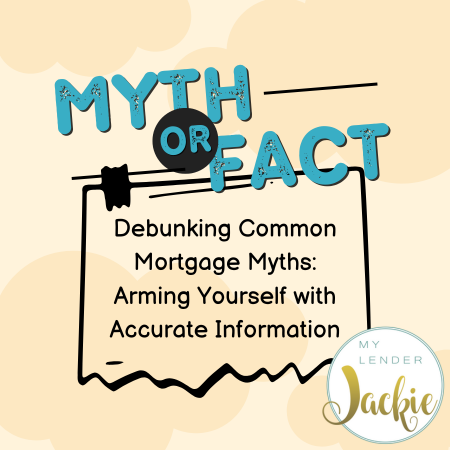Buying a home is a part of the American Dream, and because of that we hear about it all the time. Unfortunately, this can perpetuate some unhelpful mortgage myths about getting a mortgage. Before you apply for a mortgage, or decide whether you are ready to, check out this list of common mortgage myths (and the real information you need).
 Mortgage Myth: You Need a 20% Down Payment
Mortgage Myth: You Need a 20% Down Payment
One of the most common myths we here, especially from older generations, is that you need a 20% down payment to buy a home. Not only is this unattainable for most first time buyers, but it’s totally unnecessary.
While a 20% down payment can help you avoid private mortgage insurance (PMI) and reduce your overall loan amount, it is not a requirement for most buyers. Many loan programs allow for significantly lower down payments. For example, FHA loans require as little as 3.5% down and there are zero down payment options available with some VA loans and USDA loans. Even conventional loans area available with as little as 3% down.
Mortgage Myth: Pre-Qualification is the Same as Pre-Approval
We get it: the two terms sound pretty similar. However, pre-qualification and pre-approval are not the same thing and serve two different purposes. Pre-qualification and pre-approval are not interchangeable; here’s the difference:
- Pre-Qualification: This is an initial assessment of your finances based on information you provide, offering an estimate of how much you might be able to borrow.
- Pre-Approval: A more rigorous process in which we verifies your financial details, including credit score, income, and debt. It results in a conditional loan approval and demonstrates to sellers that you are a serious buyer.
Having a pre-approval strengthens your offer, especially in competitive markets, as it signals to sellers that your financing is more secure. Pre-qualification is a helpful first step if you want to get an idea of what you can afford without gathering all the essential documents, but it isn’t sufficient to prepare for making strong offers.
Mortgage Myth: Always Choose the Loan with the Lowest Interest Rate
It’s true that your interest rate makes a huge impact on the monthly payment you will have, but this is not the single most important feature of a loan. It’s a wise choice to consider different loan options, and as you do you will want to look at more than just the interest rate.
Different loans come with varying terms, fees, and conditions that can impact the overall cost of borrowing. For example:
- Points and Closing Costs: A loan with a lower rate may require you to pay higher upfront fees.
- Loan Terms: A shorter loan term (e.g., 15 years) often has a lower interest rate but higher monthly payments compared to a 30-year loan.
- Loan Types: self-employed bank statement loanSome loan types that offer the lowest interest rates won’t be the right fit for your needs. If you are self-employed, for example, qualifying for a will be far more accessible (even with a slightly higher rate).
It’s essential to weigh all aspects of a loan and calculate the total cost over its lifespan rather than focusing solely on the rate.
Mortgage Myth: You Can’t Qualify for a Mortgage If You’re Self-Employed
Being self-employed is often considered an insurmountable hurdle for hopeful homeowners, but it’s not that way with the right lender. In fact, we specialize in finding the financing solutions self-employed borrowers need, qualifying you based on your bank statements, assets, contracts from clients, and other factors that demonstrate your financial strength in a way your tax documents might not.
If you’re concerned that you won’t be able to qualify because your W-2 doesn’t show the full picture of your income, don’t worry. We can talk about different non-QM loans that might be the perfect fit for your needs.
Ready to learn more? Talk with one of our loan officers to apply for a mortgage. You can also contact us any time to learn more about the different loan options we offer and finding the right financing for your unique needs.

 Mortgage Myth: You Need a 20% Down Payment
Mortgage Myth: You Need a 20% Down Payment